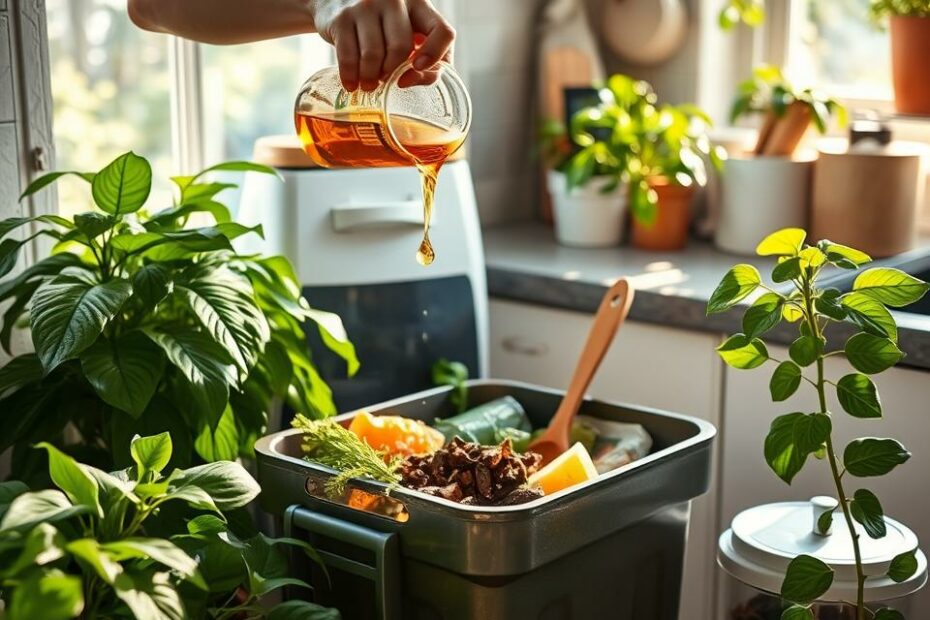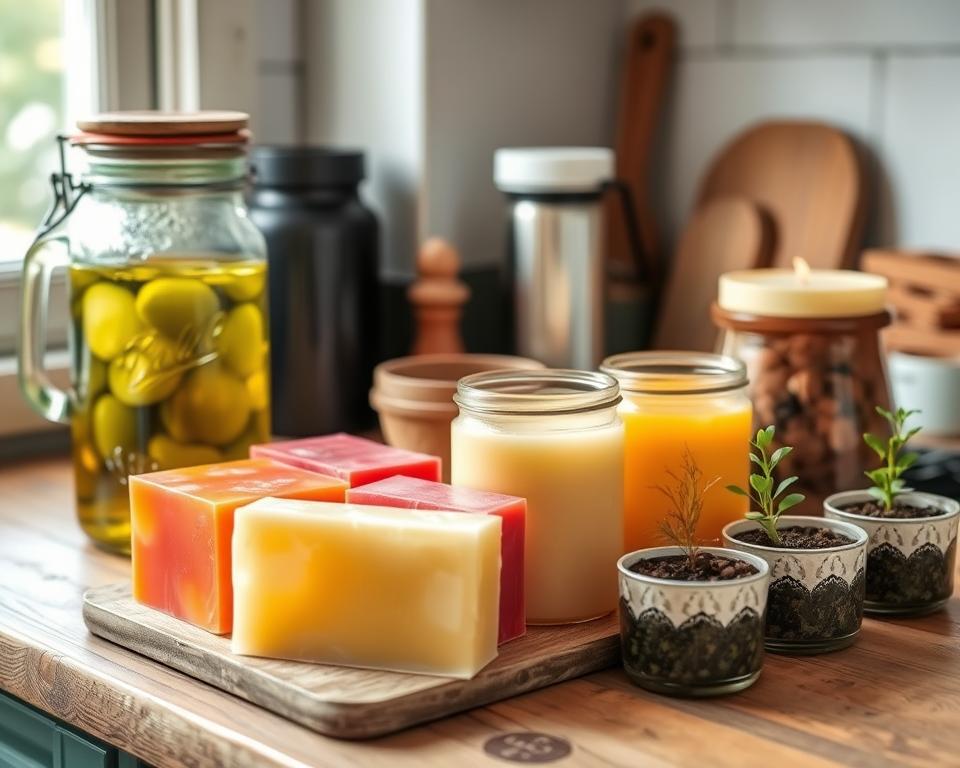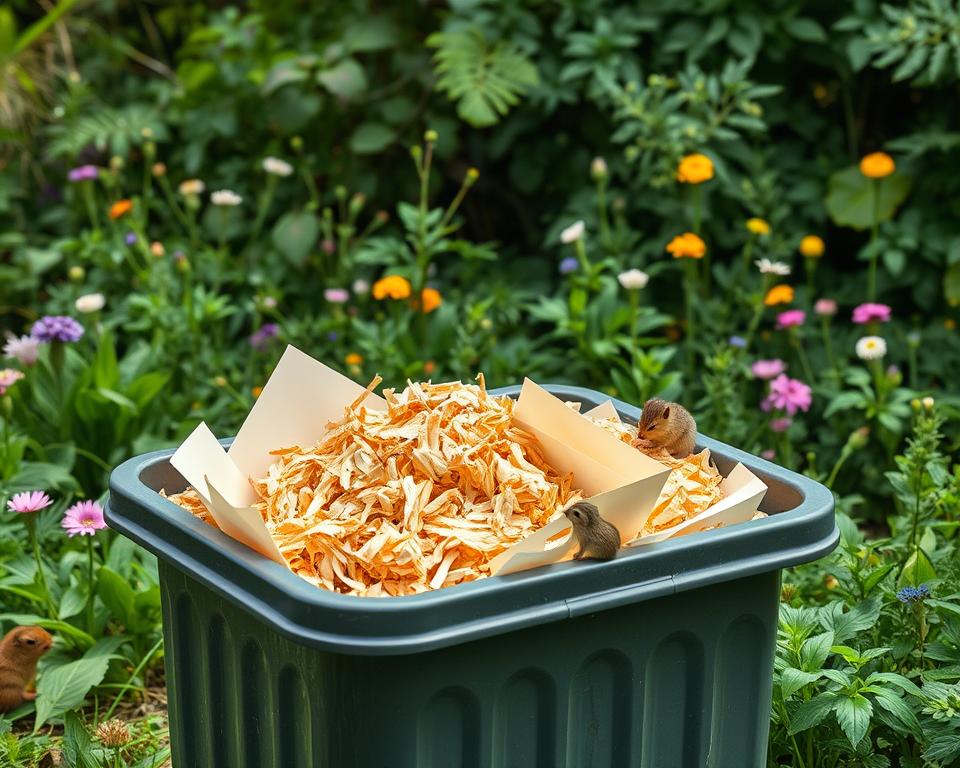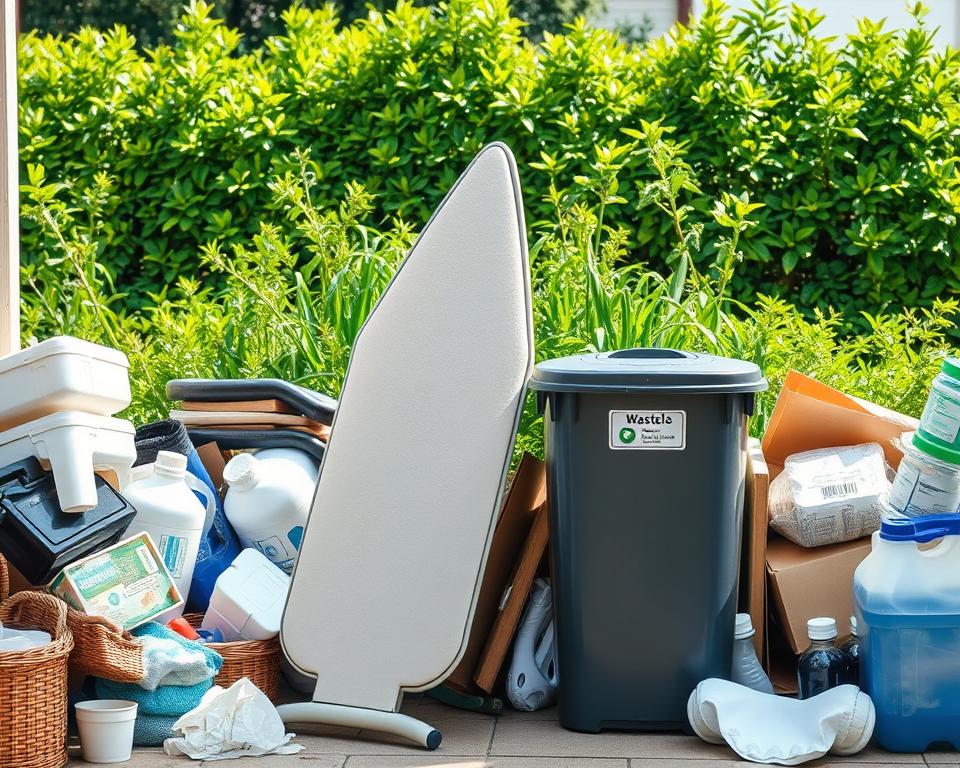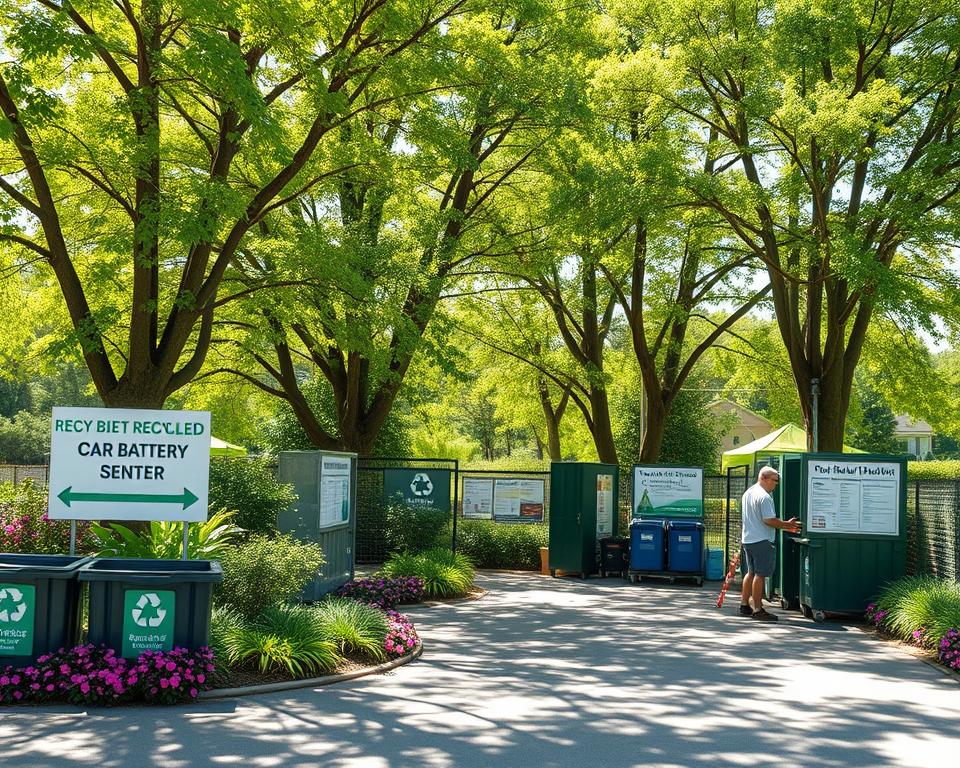Imagine the satisfying sizzle of your favorite foods filling the kitchen as you create delicious meals. But when the frying is done, what happens to the leftover cooking oil? You might be surprised to learn that improper disposal of frying oil can have a serious impact on both your home and the environment. The last thing you want is to create pollution that harms our planet.
Fortunately, there are eco-friendly ways to get rid of frying oil. These methods not only protect your plumbing but also contribute to a healthier ecosystem. From understanding the importance of proper disposal of frying oil to exploring practical reuse options, we’ll guide you on this journey towards responsible cooking practices.
Key Takeaways
- Cooking oil can be reused up to 8 times based on the type of food.
- Poor disposal can lead to pipe clogs and environmental hazards.
- Combine used oil with absorbent materials for safer disposal.
- Some local programs exist for recycling cooking oil.
- Used cooking oil can be transformed into soap or eco-friendly insecticides.
The Environmental Impact of Used Frying Oil
Used frying oil is harmful to our environment, causing many ecological problems. It can severely damage the environment if not disposed of correctly. Pouring oil down drains can clog sewage systems, leading to costly repairs.
These clogs can also disrupt local infrastructure, causing sewage overflows. This poses health risks to communities.
Used frying oil also contaminates groundwater. It takes years to break down, forming toxic substances that harm aquatic life. Wildlife can suffocate or starve from eating oil, damaging ecosystems.
In the U.S., about 750,000 restaurants produce a lot of used cooking oil. The average restaurant makes nearly 6,700 pounds of it each year. Fast-food places can produce up to 30,000 pounds annually.
Organizations like the National Renderers Association turn around 4.4 billion pounds of used cooking oil into biodiesel yearly. Recycling oil helps reduce waste and cuts carbon emissions. Making biodiesel from recycled oil can lower emissions by up to 80% per gallon.
So, it’s important to understand the harm used frying oil can cause. We must adopt better disposal methods to protect our planet.
Why You Should Not Pour Oil Down the Drain
Pouring used cooking oil down the drain is risky for plumbing systems. It can cause solid or sticky fats to build up in pipes. This buildup narrows the pipes, leading to clogs and drainage issues.
As the oil cools, it solidifies, making it hard to clear. Pouring oil down the drain is not just a problem for homes. It can also harm municipal sewer lines by breaking down into harmful substances.
These substances can form huge blockages in sewer lines. This can cause dangerous backups. It also disrupts sewage treatment and threatens our water safety.
Local councils suggest using old jars to dispose of leftover oil. Small amounts can be absorbed with paper towels and thrown away. This shows the importance of proper disposal.
Flushing hot water down the sink to melt blockages is not effective. Drain cleaners might not solve the problem and could make it worse. It’s better to dispose of oils, fats, and grease properly to keep plumbing systems working well.
Choosing eco-friendly ways to dispose of oil is important. Recycling or reusing oil is a good alternative to pouring it down the drain.
Safe Ways to Get Rid of Cooking Oil
Getting rid of used cooking oil needs care to avoid harm and protect the environment. Safe disposal methods not only keep plumbing safe but also help the planet.
Letting Oil Cool Before Disposal
Always let oil cool down before throwing it away. Hot oil can burn you and is hard to handle. Once it cools, it’s safer to move it into a container without worrying about burns.
Using Sealable Containers
Using sealable containers is a smart way to avoid spills when moving oil. Old plastic bottles or takeout containers work great. By sealing the container well, you prevent leaks and keep smells in, making disposal cleaner and safer.
Best Practices for Disposing of Frying Oil
It’s important to dispose of frying oil the right way to keep our environment safe. Using the best methods helps protect our plumbing and supports green initiatives. Two good ways are mixing oil with absorbent materials and freezing it.
Mixing Oil with Absorbent Materials
Mixing oil with things like sand or kitty litter makes it solid and easy to throw away. This method keeps oil from spilling. It’s great for big amounts of oil. Products like FryAway can also make oil solid, so it’s safe to throw away with trash.
Freezing Oil for Better Management
Freezing oil is another smart way to handle it. Some oils, like coconut oil, get solid at room temperature. Others need to be colder. Freezing makes oil easier to manage without spills. Once solid, you can put it in a sealed bag or container for safe disposal.
| Type of Oil | Best Disposal Method | Solidification Temperature |
|---|---|---|
| Coconut Oil | Freezing or mixing with absorbents | Solid at room temperature |
| Vegetable Oil | Mixing with absorbents | Requires freezing for solidification |
| Olive Oil | Mixing with absorbents | Requires refrigeration |
How to Dispose of Used Cooking Oil at Home
Getting rid of used cooking oil at home is easier than you think. It’s good for the planet and keeps our waterways clean. There are many ways to do it right, making a big difference.
Utilizing Old Plastic Bottles or Containers
Putting used cooking oil in old plastic bottles is a simple solution. Make sure the bottle is tight to avoid spills. Then, put it in a bin that can’t be recycled. This way, you follow the rules and keep things tidy.
Guidelines for Trash Disposal of Cooking Oil
Following certain rules helps keep your home clean and safe. Here are some key tips:
- Don’t use plastic bags because they can leak.
- Combine oil with cat litter to manage it better.
- Check with local restaurants if they take used oil.
- Composting vegetable oils is okay, but not animal fats.
- For lots of frying, filter and store the oil for reuse.
Recycling Used Cooking Oil
Recycling used cooking oil is a great way to reduce environmental harm. It keeps oil out of sewers and landfills. Many cities have places where you can drop off used oil from frying.
By recycling cooking oil, we manage waste better and cut carbon emissions by up to 85% per gallon. This helps fight climate change. Recycling companies make it easy by collecting and disposing of the oil for us.
These services often start with delivering a tank. It usually takes a few weeks to arrive. They plan when to pick up the oil to save resources.
It’s important to know how much oil your tank can hold. Let your service provider know when it’s almost full. The oil can be turned into biofuels, animal food, cleaning products, and even cosmetics.
Recycling cooking oil helps create a sustainable cycle. It turns old materials into new products. From soaps to beauty products, it’s all about giving old things new life. This approach benefits the environment and our community.
How to Dispose of Frying Oil Properly
It’s important to know how to get rid of frying oil the right way. This helps keep our environment safe and clean. You can take used oil to recycling centers or hazardous waste drop-off sites. These places are set up to handle the oil safely.
Following local guidelines is key to disposing of frying oil correctly. Many places offer tips on how to do it safely. Restaurants can also recycle oils like soy, corn, coconut, olive, or sunflower oil. This helps in recycling and supports a green cycle.
At home, you can store strained oil in the fridge for up to a month. Use cheesecloth or coffee filters to strain it. This way, you can reuse the oil a few times before it needs to be thrown away. Coconut oil is special because it solidifies at room temperature, unlike other oils.
- Utilize brewing grease disposal systems with large, foil-lined bags.
- Consider reducing the amount of oil used by deep frying in a deep skillet instead of a large Dutch oven.
Repurposing Old Cooking Oil
Repurposing old cooking oil is a great way to cut down on waste and get creative. Instead of tossing it or pouring it down the drain, you can find new uses for it. Two popular options are using it for soap making and making insecticides.
Using Oil for Soap Making
Turning kitchen waste into soap is a clever idea. Soap makers often use old cooking oil as a base for their creations. This not only reduces waste but also adds moisture to the soap.
The process of saponification, where oil meets an alkaline solution, turns the oil into a fragrant soap bar. It’s a fun and useful way to reuse old oil.
Making Insecticides with Cooking Oil
Using cooking oil to make insecticides is a green way to keep pests away. When mixed with natural ingredients, it can protect your garden. This approach cuts down on chemical use and gives old oil a new purpose.
As more people focus on sustainable living, making your own insecticides is becoming popular. It’s good for your garden and the planet.
Composting with Cooking Oil
Composting with cooking oil needs care and knowledge. Some plant-based oils help worms and insects in compost. Knowing how composting works helps choose the right oils for compost.
Understanding the Composting Process
Composting mixes green and brown materials. Cooking oil adds richness but too much can harm. A study shows 57% of households avoid cooking oil in compost.
This caution is often right. Finding the right balance is key to good composting.
Best Types of Oil for Composting
Not all cooking oils are good for composting. The best ones are:
- Vegetable oil
- Canola oil
- Olive oil
Adding these oils in moderation helps. About 10% of cooking oil is reused, like in animal food. This shows the need to know which oils are best for compost.
Managing oil use well helps composting. It keeps decomposition healthy and supports microbial life. This makes compost rich in nutrients.
Local Resources for Used Oil Disposal
It’s important to dispose of used cooking oil properly for the environment. Many places offer local resources for this. They help people recycle or dispose of frying oil responsibly. This prevents problems with sewers caused by fat, oil, and grease (FOG).
There are many ways to get rid of used cooking oil. Cities often have programs for hazardous waste, including used oil. People should check with their local government for these options. For example, Florida has a program called Eazy Grease Disposal. It lets residents recycle used oil, turning it into biodiesel.
- Recycling centers
- Household hazardous waste facilities
- Fire departments that accept oil
- Curbside collections for larger volumes of used oil
Community resources help a lot with proper disposal. Programs like TCEQ help local governments and small businesses follow environmental rules. They provide help and materials to promote good waste management.
Using local resources for used oil disposal is good for the environment. It also saves communities money by avoiding sewer problems. By making smart choices, people help their community and the planet.
Conclusion
Disposing of frying oil in an eco-friendly way is crucial for our planet. Using recycling, safe collection, and sealed containers helps a lot. It’s important for everyone to know how to dispose of oil properly.
Improper disposal can lead to big problems like fines and harm to wildlife. It’s not just about following rules. It’s about taking care of our planet.
Proper oil disposal has many benefits. It turns waste into useful things like biogas and animal feed. Simple actions like not pouring oil down the drain help a lot.
Working together, we can make a big difference. Whether you’re at home or running a restaurant, every small step helps. It makes our environment healthier for everyone, now and in the future.
FAQ
What should I do with used frying oil?
First, let the oil cool down. Then, put it in a sealed container. You can take it to recycling centers or mix it with sand or kitty litter before throwing it away.
Why is it harmful to pour oil down the drain?
Pouring oil down the drain can block your pipes and harm sewage systems. This can lead to expensive repairs and pollute water, harming fish and other sea creatures.
Are there any eco-friendly ways to get rid of frying oil?
Yes! You can recycle it, use it to make soap or bug spray, or compost it in small amounts. This helps the environment.
How can I freeze cooking oil for disposal?
Cool the oil, then pour it into a sealed container. Freeze it. Once it’s solid, you can throw it away without spills.
What types of cooking oil can I compost?
Some plant-based oils are okay for compost. But use them sparingly. Too much oil can kill your compost.
Where can I find local resources for disposing of frying oil?
Look up local recycling centers, fire departments, or waste management. They can tell you how to safely dispose of used oil in your area.
Can I simply throw used cooking oil in the garbage?
No, don’t pour oil straight into the trash. Instead, store it in a sealed container. Or mix it with absorbent materials before throwing it away.
What are the dangers of improper frying oil disposal?
Bad disposal can pollute the environment, harming animals and water. It can also cause expensive plumbing problems.
